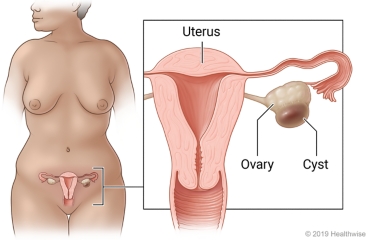Overview
An ovarian cyst is a sac that forms on the ovary and swells up with fluid. If the cyst breaks open, it is called a ruptured ovarian cyst. Sometimes a cyst may rupture and then form again. Sometimes a cyst may partly break open. This can release blood and fluid into the lower belly and pelvis.
You may not have symptoms from the cyst. But if it is large, or if it twists or bleeds, you may have pain or other problems. You may feel pain because the fluid irritates the pelvis.
Your doctor may use a pelvic ultrasound to see if you have a cyst. Your doctor may also do blood tests.
Treatment depends on your symptoms. If they are mild, your doctor may suggest carefully watching your symptoms. But if you have a cyst that is very large, bleeds a lot, or causes other problems, your doctor may suggest surgery to remove it.
Follow-up care is a key part of your treatment and safety. Be sure to make and go to all appointments, and call your doctor if you are having problems. It's also a good idea to know your test results and keep a list of the medicines you take.


